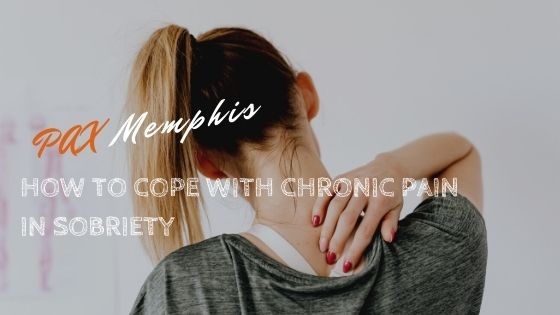Chronic pain management is a major challenge for many people in sobriety. This especially true for individuals recovering from opioid addiction. After all, some people become hooked on their prescription medications after developing a chronic pain condition. Treatment programs and sober living typically discourage the use of prescription pain medications, especially ones that are habit-forming. This makes it difficult for people in recovery to find a pain management program that works for them. As a result, it is not uncommon for people in recovery to relapse on opioid pain medications due to chronic pain.[1]
The good news is there are ways to cope with chronic pain in sobriety. And, a drug and alcohol rehab in Memphis can show people the way.
Treating Chronic Pain
Chronic pain is a complex and difficult condition to treat – even without a substance use disorder. Many current treatment protocols for long-term pain management call for some form of prescription medication, which is most commonly opioids.[2] The use of opioids in treating chronic pain perpetuates the cycle of addiction and makes developing a treatment plan for someone in recovery especially challenging.
Knowing alternative ways to cope with chronic pain will help individuals prevent relapse and maintain long-term recovery. There are some natural ways for people in recovery to relieve chronic pain without having to turn to medications. Let’s take a look at a few.
Exercise
Exercise may seem counterintuitive when considering treatment for chronic pain, but it is actually incredibly beneficial to the mind and body. Exercise improves chronic pain in several different ways. During physical activity, the brain releases chemicals that act as natural pain relievers.
Regular movement also reduces joint stiffness and discomfort. In addition to this, exercise also naturally boosts the body’s immune system and helps reduce depression. This works to reduce inflammation and heal damaged tissue that may be contributing to chronic pain.[3]
Meditation
Studies show that meditation naturally decreases chronic pain. Meditation retrains the brain. With regular meditation, the brain and body are able to better cope with chronic pain in sobriety. Meditation improves overall mood and by doing so, induces the brain to generate more naturally occurring pain-reducing chemicals. (https://welterheating.com/) This means people practicing meditation are not only developing a more positive outlook on life but also having real and meaningful chemical changes occur in their body to improve pain.[4]
Yoga
Yoga is another great way to naturally decrease chronic pain while also benefiting recovery. Yoga has the benefits of exercise combined with the benefits of meditation. It is an especially good choice for people in early pain management, as yoga allows for exercise that is gentle on the joints and stretches important muscle groups to slowly build strength and improve pain levels.
Yoga also commonly incorporated meditation techniques in addition to low-impact exercise. Overall it improves physical as well as mental health. Maintaining both physical and mental health is crucial for properly managing chronic pain in sobriety.
Healthy Eating
Nutrition is an important component of managing chronic pain naturally and staying sober. Inflammation in the body negatively influences pain levels. Diet is a direct contributor to inflammation levels in the body, meaning what a person eats determines how much inflammation they will have. Diets that revolve around eating healthy, anti-inflammatory foods are shown to reduce inflammation and significantly improve chronic pain.[5]
Some foods that help reduce inflammation in the body are:
- Fruits
- Veggies
- Whole grains
- Lean protein such as chicken or fish
Acupuncture
Acupuncture is a relatively new treatment for chronic pain. Studies show that it works to reduce chronic pain in the form of headaches, musculoskeletal pain, and arthritic pain. Acupuncture is the practice of inserting very small needles into specific points on the body. While there is no concrete evidence on how it exactly works, it is thought to stimulate nerves and muscle groups that release natural analgesics in the body.[6]
Physical Therapy
Physical therapists often work with chronic pain patients to develop natural ways to manage chronic pain in sobriety. During physical therapy, a trained professional will manipulate and stretch joints and muscle groups to relieve pain. They will be able to instruct a person with chronic pain on what exercises and stretches to do that target the specific areas contributing to their pain.
Massage
Massage therapy is shown to promote relaxation, reduce tension, and, most importantly, relieve chronic pain. During a massage, the therapist will focus on regions that are sources of pain. The act of manipulating tissue increases the temperature of the muscle, which causes it to become more flexible and thus reduces tension and pain. It also improves circulation, so oxygen flow and tissue repair are enhanced by massage. This promotes the healing of damaged areas in the body that may be causing chronic pain.[6]
Learn How to Cope with Chronic Pain in Sobriety
People in sobriety require extra support for pain management. In addition to naturally treating the pain itself, they also need to treat the addiction. Inpatient treatment for opioid abuse is helpful for people who are also struggling with chronic pain.
During treatment, patients can begin to implement natural and holistic pain management techniques while treating their addiction. At PAX Memphis, our staff works with individuals to develop a recovery plan that incorporates a healthy pain management program. To learn more about our treatment programs or to find help today, give us a call.
References:
- https://www.ncbi.nlm.nih.gov/books/NBK92051/
- https://www.ncbi.nlm.nih.gov/pmc/articles/PMC315480/
- https://health.clevelandclinic.org/anti-inflammatory-diet-can-relieve-pain-age/
- https://pubmed.ncbi.nlm.nih.gov/29198932/
- https://www.physio.co.uk/treatments/massage/when-can-massage-help/chronic-pain.php
Medically Reviewed: September 25, 2019

All of the information on this page has been reviewed and verified by a certified addiction professional.










